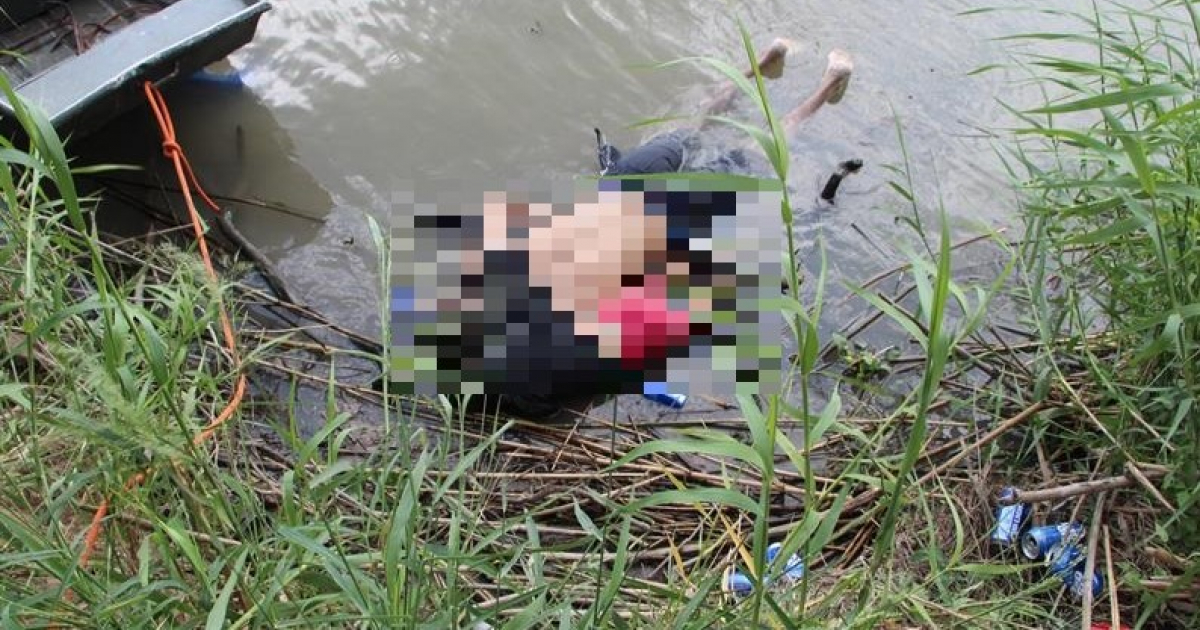
Matamoros (Mexico), June 26 (EFE).- The image of a Salvadoran man and his two-year-old daughter drowned in the Rio Grande, on the border between Mexico and the United States, reflects the desperation of migrants seeking asylum in that country and the dangers they face in their odyssey, said this Wednesday the author of the photograph, Abraham Pineda Jácome, from Agencia Efe.
The photo shows the bodies of Óscar Martínez, 25, and his daughter Valeria lying face down on the bank of the river on the Mexican side.
The upper half of the little girl's body is wedged between the father's shirt and torso, suggesting that the man was trying to protect her in some way in their final moments.
The powerful image recalls the 2015 photo of a three-year-old Syrian boy fleeing the war in his country, presumably in the company of family members, drowned on a Turkish beach.
Pineda learned of citizen reports of migrants drowning in the Rio Grande, which prompted authorities to launch a rescue operation Sunday afternoon in the border municipality of Matamoros, in the northeastern Mexican state of Tamaulipas.
"But they had to suspend the operation because night came. There is no light in that place and visibility is zero, so nothing could be done. The next day at nine in the morning they resumed it. I was already in the place waiting for activities to resume," says the photographer.
He says that two Civil Protection agents boarded a boat and began a search in the river. About an hour later, agents who were on land informed him that bodies had been found floating in the water, which were washed ashore.
"I ran to the site to corroborate what they were telling me and where I arrived I saw the bodies face down on the bank. I saw this image and the only thing I did out of inertia, as a journalist, was take the photographs. Then I left because the authorities arrived. and they were going to cordon off the area," he says.
For Pineda, the death of Óscar and Valeria is "a result of the hardening of the immigration policies of both the United States and Mexico."
He points out that there was a time when the United States was giving asylum to migrants arriving through Matamoros, but with the tightening of the policy they have been accumulating at the border. "We are talking about Cubans, Central Americans, South Americans, some of whom have chosen to jump into the river and swim across," he adds.
"Many of them have a theory that if they get to the other side, the United States has to listen to their request for asylum. I don't know how true that is. But they become desperate," he says.
Pineda spoke with Óscar's brother, who told him that he recommended his relative not to try to swim across because "the river was very criminal."
"And the truth is that it does because every month a migrant drowns. He (Óscar) didn't pay attention and jumped in out of desperation instead of waiting two or three months here in Matamoros for his request to be resolved. He wanted to speed things up but It was counterproductive," he says.
Regarding the potential impact of his photography on immigration policies, he considers that "it could have a positive effect on a part of the United States society, but the truth is that I don't think it will move anything directly to (US President Donald) Trump."
And as for Mexico, he says he learned that President Andrés Manuel López Obrador was asked to express his position on the photo "and he only said that he was sorry, but apart from that there was no other reaction."
"In fact, just yesterday the National Guard arrived in Matamoros to accompany elements of the National Migration Institute (Inami) to review the documents of those seeking asylum. The Guard was supposed to take care of the population, but it turns out that It is to protect the border," he says.
Last Monday, the Mexican Secretary of Defense, Luis Cresencio Sandoval, pointed out that more than 20,000 members of various units already support Inami on the borders.
On the northern border there are around 15,000 members of the Army and the National Guard, a new police-military security body that will formally take effect on June 30.
Abraham Pineda says he has not yet read the note released this Wednesday by the Vatican in which Pope Francis expressed "immense sadness" after seeing the photo of the dead Salvadoran and his daughter.
However, the photographer points out that the Catholic diocese of Matamoros does "excellent work" to help migrants.
What do you think?
COMMENTFiled in: